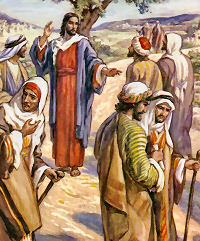» Enjoy our Liturgical Seasons series of e-books!
Entrance Antiphon, Cf. Ps 17(16):15:
As for me, in justice I shall behold your face; I shall be filled with the vision of your glory.
Gospel Verse, Year C, Cf. Jn 6:63c-68c:
Your words, Lord, are Spirit and life; you have the words of everlasting life.
Gospel Excerpt, Luke 10:33-34:
But a Samaritan traveler who came upon him was moved with compassion at the sight. He approached the victim, poured oil and wine over his wounds and bandaged them. Then he lifted him up on his own animal, took him to an inn and cared for him
Sunday Readings, Year C:
The First Reading is taken from the book of Deuteronomy 30:10-14 and is the final discourse of Moses, just prior to the selection of Joshua to lead the people into the promised land. It is the conclusion of the covenant making ceremony.
The Second Reading is from the letter of Paul to the Colossians 1:15-20 in which he uses the occasion to instruct the Colossians and to restate for them the truth about the absolute supremacy of Jesus Christ, as beginning and end of all creation. He was imprisoned in Rome when he wrote this letter but had learned about dangerous doctrines which had recently made their way into the church, threatening both faith and morals. False teachers were introducing a series of outdated Mosaic practices and an exaggerated emphasis on the role of angels as intermediaries between God and men, which threatened to undermine the true doctrine of Christ as the only mediator.
The Gospel is from St. Luke 10:25-37 and tells the parable of the good Samaritan. This passage is two-pronged. While providing a powerful lesson about mercy toward those in need, it also proclaims that non-Jews can observe the Law and thus enter into eternal life. Following other Fathers, St Augustine (De verbis Domini sermones, 37) identifies the good Samaritan with our Lord, and the waylaid man with Adam, the source and symbol of all fallen mankind. Moved by compassion and piety, he comes down to earth to cure man's wounds, making them his own (Is 53:4; Mt 8:17; 1 Pet 2:24; 1 Jn 3:5). In fact, we often see Jesus being moved by man's suffering (cf. Mt 9:36; Mk 1:41; Lk 7:13). And St John says: "in this the love of God was made manifest among us, that God sent his only Son into the world, so that we might live through him. In this is love, not that we loved God but that he loved us and sent his Son to be the expiation for our sins. Beloved, if God so loved us, we also ought to love one another" (1 Jn 4:9-11).
This parable leaves no doubt about who our neighbor is — anyone (without distinction of race or relationship) who needs our help; nor about how we should love him — by taking pity on him, being compassionate towards his spiritual or corporal needs; and it is not just a matter of having the right feelings towards him: we must do something, we must generously serve him.
Christians, who should be disciples of Christ, should share his love and compassion, never distancing themselves from others' needs. One way to express love for one's neighbor is to perform the "works of mercy," which get their name from the fact that they are not duties in justice. There are fourteen such works, seven spiritual and seven corporal.
The spiritual are:
- To convert the sinner;
- To instruct the ignorant;
- To counsel the doubtful;
- To comfort the sorrowful;
- To bear wrongs patiently;
- To forgive injuries;
- To pray for the living and the dead.
The corporal works are:
- To feed the hungry;
- To give drink to the thirsty;
- To clothe the naked;
- To shelter the homeless;
- To visit the sick;
- To visit the imprisoned;
- To bury the dead.
—Excerpted from The Navarre Bible—St. Luke






